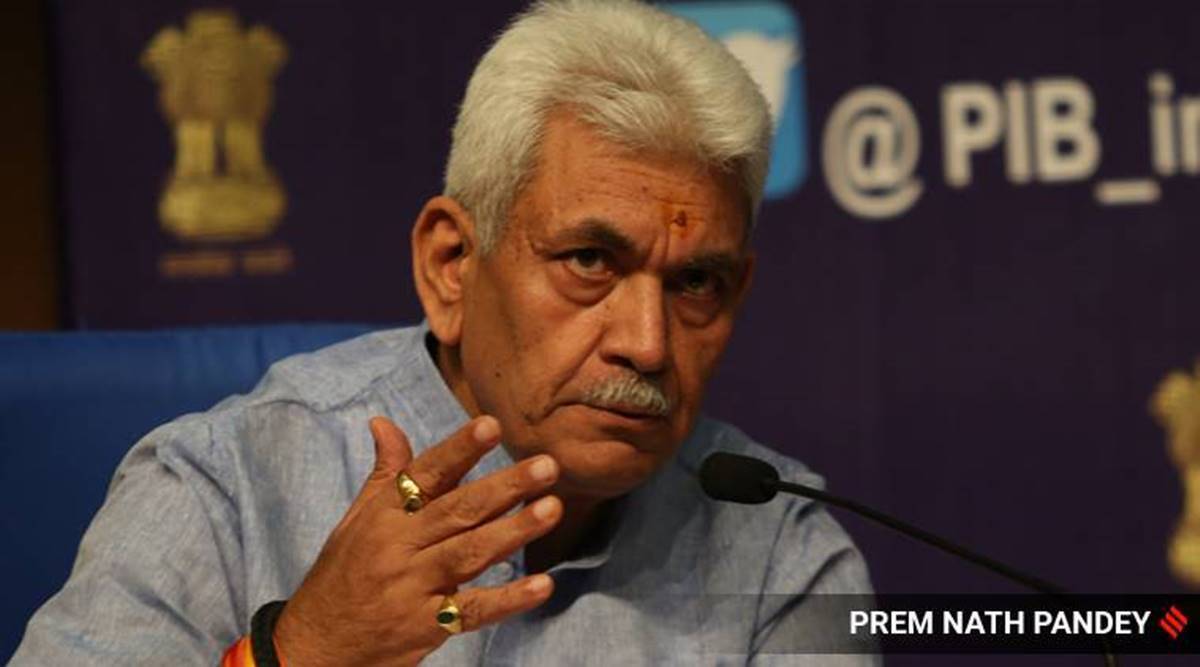 Jammu and Kashmir Lieutenant Governor Manoj Sinha
Jammu and Kashmir Lieutenant Governor Manoj Sinha KASHMIRIS SHOULD not look for jobs in the Valley alone, but also venture out for opportunities, Jammu and Kashmir Lieutenant Governor Manoj Sinha said on Wednesday.
“There is peculiar social problem among Kashmiris. They don’t want to go outside Kashmir. There is a Tata Technology Centre in Baramulla. I met 58 engineering graduates and post graduates. They had been trained in artificial intelligence, robotics, everything. But when I asked Tata guys how many of them were in job, they said 7. I was like what is the point of running a centre that can ensure jobs for only 7 out of 58. He said students were not ready to go outside of Kashmir. Kashmir needs to come out of this mindset,” Sinha said.
He was speaking at an event to launch the book, “Two Kashmirs, A Comparative Analysis”, by Sheikh Khalid Jehangir at Indian International Centre here.
Narrating a similar incident in Bandipora, Sinha said, “In Bandipora, the DM had organised a job fair. A Chennai-based mobile manufacturing company had come there and offered jobs to 18 people. Only two joined. So I wish to urge the Kashmir intelligentsia that it is important to create more opportunities in Kashmir and the same is being done, but we also need to go out and look for opportunities.”
Under Sinha, according to his administration, investments of more than Rs 50,000 crore have been approved and as many as four corporates are setting up manufacturing units in the Valley that will generate thousands of jobs. Earlier, following the abrogation of Article 370 in August 2019, then Governor Satya Pal Malik had announced that the administration would provide government jobs to 50,000 youth.
Sinha said that a lot of misinformation was being spread about Kashmir and foreign media was responsible for it. “A large section of the western media is engaged in spreading misinformation about Kashmir. They talk about democracy, but their contribution in spreading this misinformation is greater than Pakistan,” Sinha said.
Ruling out talks with Pakistan on Kashmir, Sinha said, “Some people keep trying that nothing is set right in Kashmir until we engage with Pakistan. These are those people who have brought Kashmir to this stage. They are more dangerous than those directly associated with militancy. These are those people who feel that until a certain level of violence is maintained in the Valley, Delhi won’t value them. But people have begun to understand these things.”
Sinha also flagged the increasing age for marriage among women in Kashmir.
“The second social ill that I have recently observed is that the age of marriage is increasing in Kashmir. Terrorism has not just disturbed peace but also wrecked the economy, increased unemployment and pushed people into drugs. The average age of marriage of girls in Kashmir has gone up to 32 years. When asked about it people say they want to first economically secure themselves and build a house. We need to fight this together,” he said.
Underlining the return of peace and prosperity in Kashmir, Sinha said he had been informed by someone that people were building farmhouses on the outskirts of Srinagar. He said two youth also told him near Dal Lake that Srinagar should be transformed into Greater Noida and Lonavala. He said this showed that the mindset in Kashmir was changing and this was possible because of perception of peace in the Valley and the end of atmosphere of fear and uncertainty.
“It is a great achievement that people have begun to have faith in rule of law in Kashmir,” Sinha said.
He said that a lot of money has been spent by the Centre on Kashmir but earlier it was not being utilised properly. He said in 2017, the per capita spending of the Centre in rest of India was Rs 8,277, while in Kashmir it was Rs 27,835. He said earlier this spending was benefiting only a few people in Kashmir, but now it was benefiting the common man.